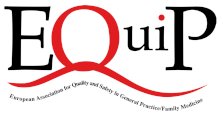

Digitalisation and artificial intelligence (AI) have opened a new era in healthcare, fundamentally transforming various medical fields, including family medicine. These technological advancements promise to enhance the quality and safety of patient care, streamline operations, and empower both patients and healthcare providers with better tools and information. At the 65th EQuiP Conference, we would like to explore the impact of digitalisation and AI on family medicine, focusing on how these technologies improve healthcare delivery, patient outcomes, and overall system efficiency. We didn’t forget on EQuiP traditional topics like Professionals Health, Planetary health and Quality of care.
Digitalisation and AI could contribute significantly to the quality of care in family medicine by:
Improved Diagnostics: AI algorithms can analyse vast amounts of medical data swiftly and accurately, aiding in early detection and diagnosis of diseases.
Personalised Treatment Plans: By leveraging AI, family doctors can develop personalised treatment plans tailored to individual patient profiles. AI systems can consider a patient’s medical history, genetic information, and lifestyle factors to suggest optimal treatment options, ensuring more effective and targeted healthcare.
Enhanced Monitoring and Follow-up: Wearable devices and mobile health applications enable continuous monitoring of patients' vital signs and health metrics. This data can be integrated into EHRs, allowing family doctors to track patient progress in real-time and make informed decisions promptly.
The integration of digital tools and AI in family medicine enhances patient safety through:
Reduction of Human Error: AI systems can assist in reducing human errors by providing decision support, flagging potential drug interactions, and ensuring compliance with clinical guidelines. This reduces the likelihood of medical errors and enhances patient safety.
Efficient Data Management: Digitalisation facilitates efficient management of patient data, ensuring that accurate and up-to-date information is readily available. This minimises the risks associated with fragmented or incomplete patient records, contributing to safer clinical practices.
Predictive Analytics: AI can identify patterns and predict potential health risks before they become critical. For instance, predictive analytics can foresee which patients are at higher risk of complications, allowing for proactive measures to prevent adverse outcomes.
While the benefits of digitalisation and AI in family medicine are substantial, several challenges need to be addressed:
Data Privacy and Security: Ensuring the confidentiality and security of patient data is paramount. Robust cybersecurity measures and strict data governance policies are essential to protect sensitive health information.
Integration with Existing Systems: Seamless integration of new digital tools with existing healthcare systems and workflows is crucial. This requires significant investment in infrastructure and training for healthcare professionals.
Ethical and Bias Concerns: AI systems must be designed to avoid biases that could affect clinical decision-making. Ensuring ethical standards in the development and deployment of AI technologies is essential to maintain trust and fairness in patient care.
The impact of digitalisation and artificial intelligence on family medicine could be profound, offering significant enhancements in the quality and safety of patient care. By improving diagnostics, personalising treatment plans, and enabling continuous monitoring, these technologies empower family doctors to deliver more effective and efficient healthcare. However, addressing challenges such as data security, system integration, and ethical concerns is crucial to fully realise the potential of digitalisation and AI in family medicine. The goal of digital transformation should remain affordable, safe and high-quality of care for all patients.
Host Organizing Committee
Prof. Dr. Erika Zelko
Chair of the Organization Committee
Institut für Allgemeinmedizin
Johannes Kepler Universität Linz


This conference is organised by EQuiP, in collaboration with Johannes-Kepler-University Faculty of Medicine.


